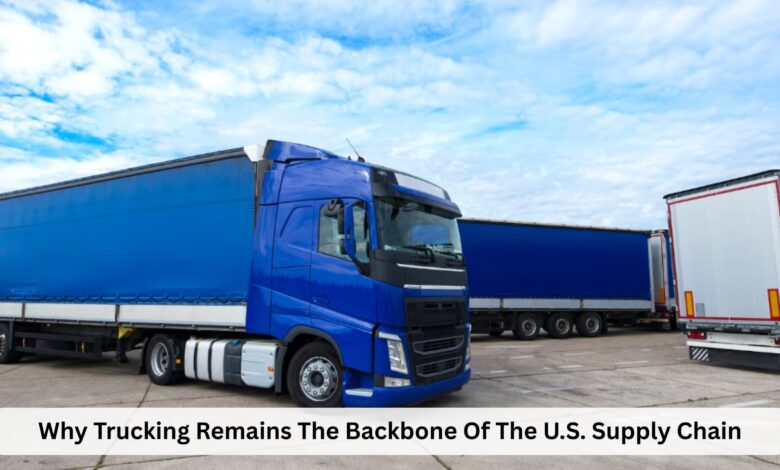Why Trucking Remains The Backbone Of The U.S. Supply Chain

Trucking remains the backbone of the U.S. supply chain because it connects every part of the economy. From the food on grocery store shelves to the raw materials in factories, trucks play a vital role in keeping goods moving. Without them, the country’s entire delivery system would slow to a halt.
In fact, over 70% of all freight in the U.S. is transported by trucks. This shows how essential trucking is for daily life and business operations. This article explores why trucking remains the heart of the U.S. supply chain, how it supports industries, the challenges it faces, and why it will remain important in the future.
1. Trucks Deliver Nearly Everything You Use
A truck moves almost everything that Americans use every day at some point. The trucking industry ensures that essential goods like food and petrol reach their destinations. Manufacturers need trucks to deliver raw materials, and retailers need trucks to deliver finished goods.
Trucking is essential for online purchasing, too. Once your shipment leaves the warehouse, a truck delivers it to your home.
Trucks can go practically anywhere, making them more flexible than railroads, ships, or planes. They go on highways, country roads, and even through neighborhoods. Because they can deliver to the “last mile,” they are crucial to the entire supply chain.
Trucking ensures that commodities in America never stop moving. Without trucks, stores would quickly run out of goods, and businesses would struggle to operate.
Further, resources such as OTR driver news can keep truckers in touch and up to date on essential road information, including new regulations, weather warnings, technological advances, and fuel prices. Being informed makes drivers more innovative, more compliant, and more effective.
2. Trucking Connects All Other Transport Modes
Trucking connects ports, trains, and airports, enabling the entire supply chain to operate. When ships carry products to U.S. ports, trucks move the containers to rail yards or warehouses. When railroads move large amounts of goods across states, trucks deliver them to the customer.
Trucks are still needed to pick up and provide air freight. This network connection ensures that items move smoothly. Trucks connect major transportation hubs to nearby areas. Without this link, cargo would remain trapped in ports or terminals, slowing manufacturing and sales.
Trucking keeps the U.S. logistics system together, in a nutshell. It keeps trade going and businesses operating by moving goods from point A to point B and everything in between.
3. Trucking Supports Millions of Jobs
The American Transportation Association (ATA) estimates that roughly 8 million people in the U.S. work in transportation-related jobs. This comprises drivers, mechanics, dispatchers, warehouse workers, and others who oversee logistics.
There are trucking jobs in every state, from tiny towns to big metropolises. This makes trucking one of the easiest areas to get into in the country.
Aside from direct jobs, trucking also supports businesses like manufacturing, retail, and agriculture. When trucks deliver goods quickly, companies can keep operating and create additional jobs. In many rural communities, trucking jobs are one of the most stable ways to make money.
The industry also enables people to run their own businesses. Many drivers work for themselves or form their own fleets. This supports the local economies and keeps the U.S. workforce strong and diverse.
4. Trucking Keeps the Economy Moving
A booming economy depends on a good trucking infrastructure. Trucking helps the economy flourish by ensuring that goods reach their destinations swiftly and safely. Companies can meet client demand, keep production lines moving, and avoid costly delays when products arrive on time.
Trucks also help keep supply and demand in balance between regions. For instance, they bring food from California fields to stores in New York.
Trucking becomes much more critical during natural disasters or supply chain issues. Drivers deliver emergency supplies, including food, water, and medical aid, to areas that need them. Because it is fast and reliable, trucking is the most flexible way to move freight.
The economic impact is enormous. The U.S. trucking industry moves over 11 billion tons of freight each year, generating hundreds of billions of dollars in revenue. Every shipment, big or small, helps keep the economy going.
5. Trucking Adapts to Modern Technology and Sustainability
Trucks today are getting smarter and cleaner. GPS tracking, automated dispatching, and real-time route optimization all help make deliveries faster and more efficient. These new ideas help businesses save money and reduce pollution by using less fuel.
Electric and hybrid trucks are also becoming more common, which is good for the environment. To make freight transportation more eco-friendly, big companies are investing in pollution-free trucks. Also, improved engines and cleaner fuels are making diesel trucks less polluting.
Drivers’ lives have also gotten easier thanks to technology. Digital platforms make it easier to handle paperwork, communicate, and ensure safety rules are followed.
Trucking is still at the center of America’s logistics network, and with these improvements, it is becoming more modern without losing its dependability.
Conclusion
Trucking remains the most critical part of the U.S. supply chain because it connects people, places, and things in ways no other mode of transportation can. It moves essential goods, supports millions of jobs, powers the economy, and can evolve with the times. Even as technology and automation improve, vehicles will always be needed to deliver the last mile.
The route may change, but trucking will always be America’s lifeline. Every shipment, every mile, and every driver keeps the country moving forward. This shows once again that America stops without trucks.




